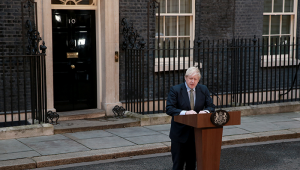The footballer Paul Gascoigne once said: “I never predict anything, and I never will.” This quote used to be mildly amusing, but it now feels like cutting edge political satire. It is the season for New Year pronouncements. Dare we take the risk after last year’s surprises?
We need to make sure that 2017 is the year of integrity. A tough challenge given the backdrop, and tougher still for those experiencing budget cuts that go well beyond what is reasonable or necessary in some areas. But in amongst the policy chaos, plenty of good people are still pushing hard to improve lives for others. What will it take to support them?
1. The return of public services - the only way that prime minister Theresa May’s agendas for industrial strategy and improving living standards can be properly realised is through public services. So, 2017 needs to be the year when spending money on public services becomes a more explicit part of the government’s economic strategy. This is not just about filling gaps that have opened in provision – it is about public service reform as part of a different model of whole-system productivity and inclusive growth. Look at Oldham’s emerging agenda for co-operative growth for clues.
2. The revenge of the rust belt - the long-term success of the Northern Powerhouse agenda depends on more than shiny buildings in metro city centres. In places like Sunderland and Coventry, it is collaboration between public, private and social sectors that will drive progress, with a key role for civic-minded universities, forward-thinking FE colleges and civic leaders who see the value in a human capital strategy that builds for the long term. These places can become the new centres of collaborative innovation, and our post-Brexit fiscal strategy needs to actively enable this.
3. The seeds of social capital – a steady drip of academic and policy research proves that social isolation is a massive driver of poor health and work outcomes. 2017 needs to be the year we put the social back in our health and care services, prioritising connections between and within communities, and the building of trust between citizens and the people delivering services (from retail to refuse) on their behalf. We are excited to be working in a diverse range of places – from Sutton to Singapore – to explore this issue.
4. The other infrastructure gap - the chancellor is right to highlight our infrastructure gap – but this is not just about roads and railways – the renewal of places depends on us understanding the social and public infrastructure gap. Changing life chances in our towns and cities requires us to grasp the nettle and put in place new system infrastructure that can support collaborative working at a meaningful scale. Greater Manchester is making a start, but our work with the Lankelly Chase, a charity that focuses on clusters of poverty and social disadvantage, shows that more needs to be done to develop an infrastructure for change that can make a difference to social outcomes. Without this, the rhetoric of ‘shared society’ will remain hollow, and people experiencing complex needs will continue to be marginalised by punitive reforms and disconnected services.
5. Collaborative leadership with integrity - underpinning all of this is a set of unanswered but critical questions about what it takes to lead social change in 2017. We have been working with a group of local government chief executives who are asking what it takes to go beyond organisational excellence, and when the ability to influence, enable and reflect is increasingly critical to changing outcomes in a place. We will be testing this proposition with a cross-sector leadership audience over the coming months.
This is the year that big-ticket political changes start to become a reality. Trump and Brexit take the headlines, and may help or hinder the agendas that keep us awake at night (we have our opinions, but who really knows?). But underneath all of this is a group of people doing the hard yards of driving forward services to the public to effect meaningful change on the ground. So our New Year’s resolution is to support those leaders, building the collaborative capacity that can make a difference in 2017.



















